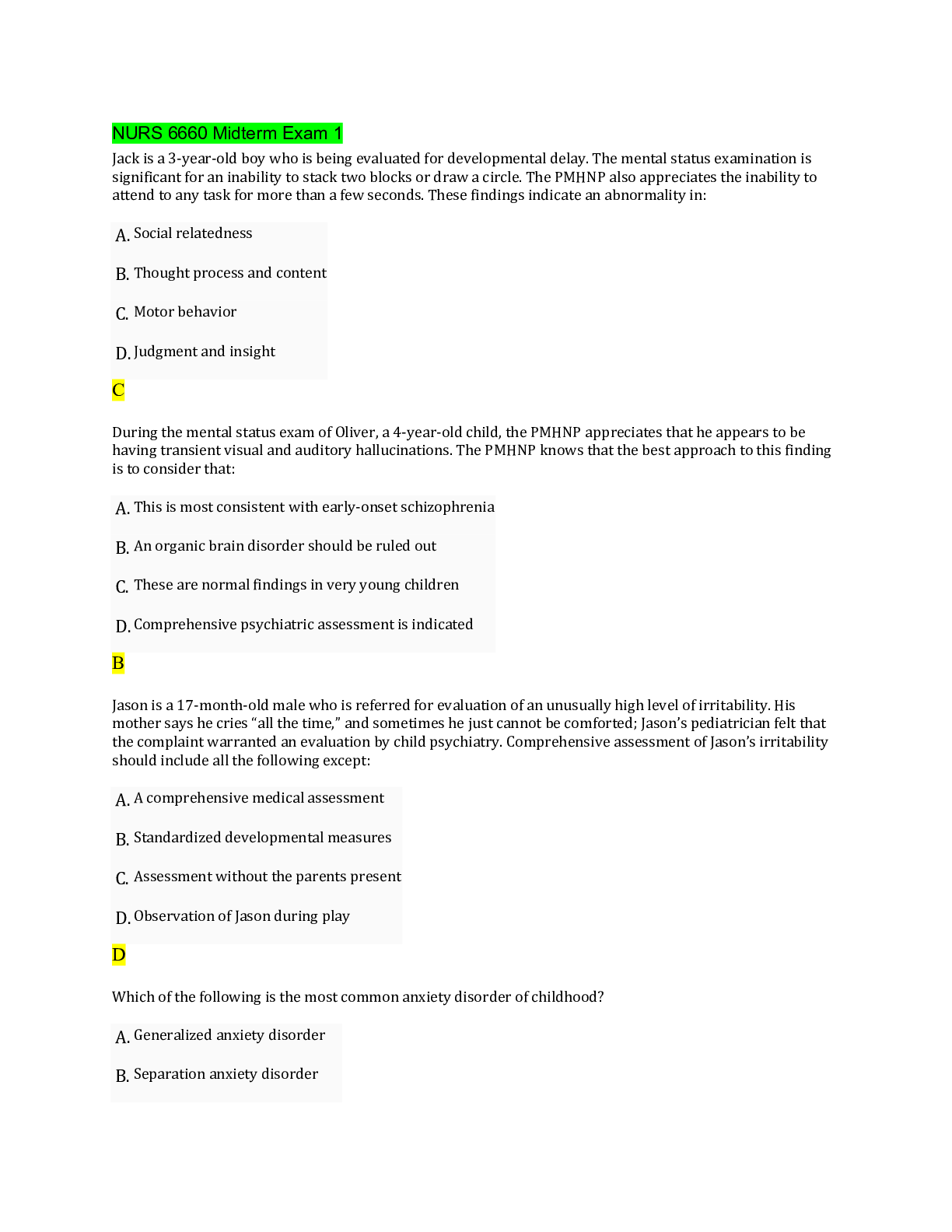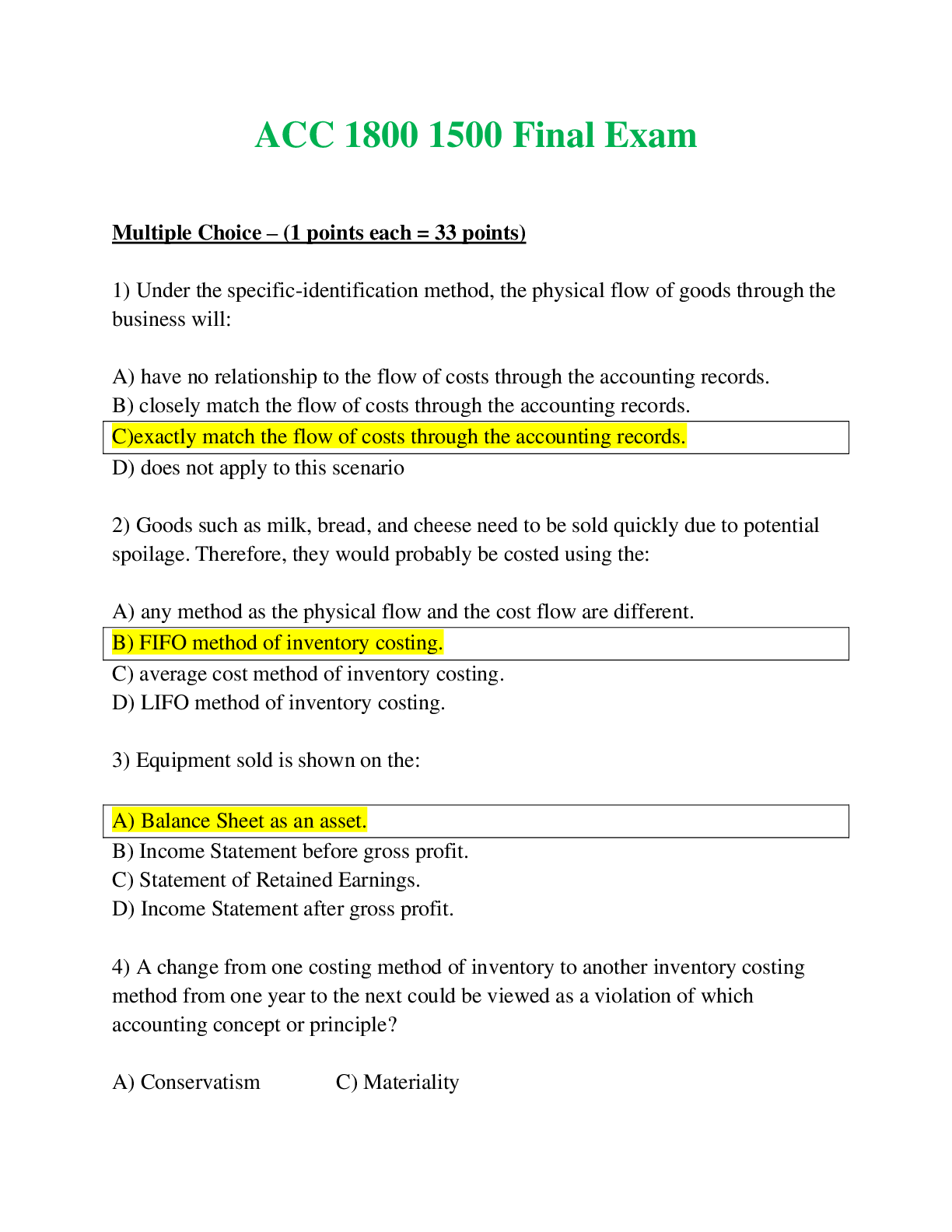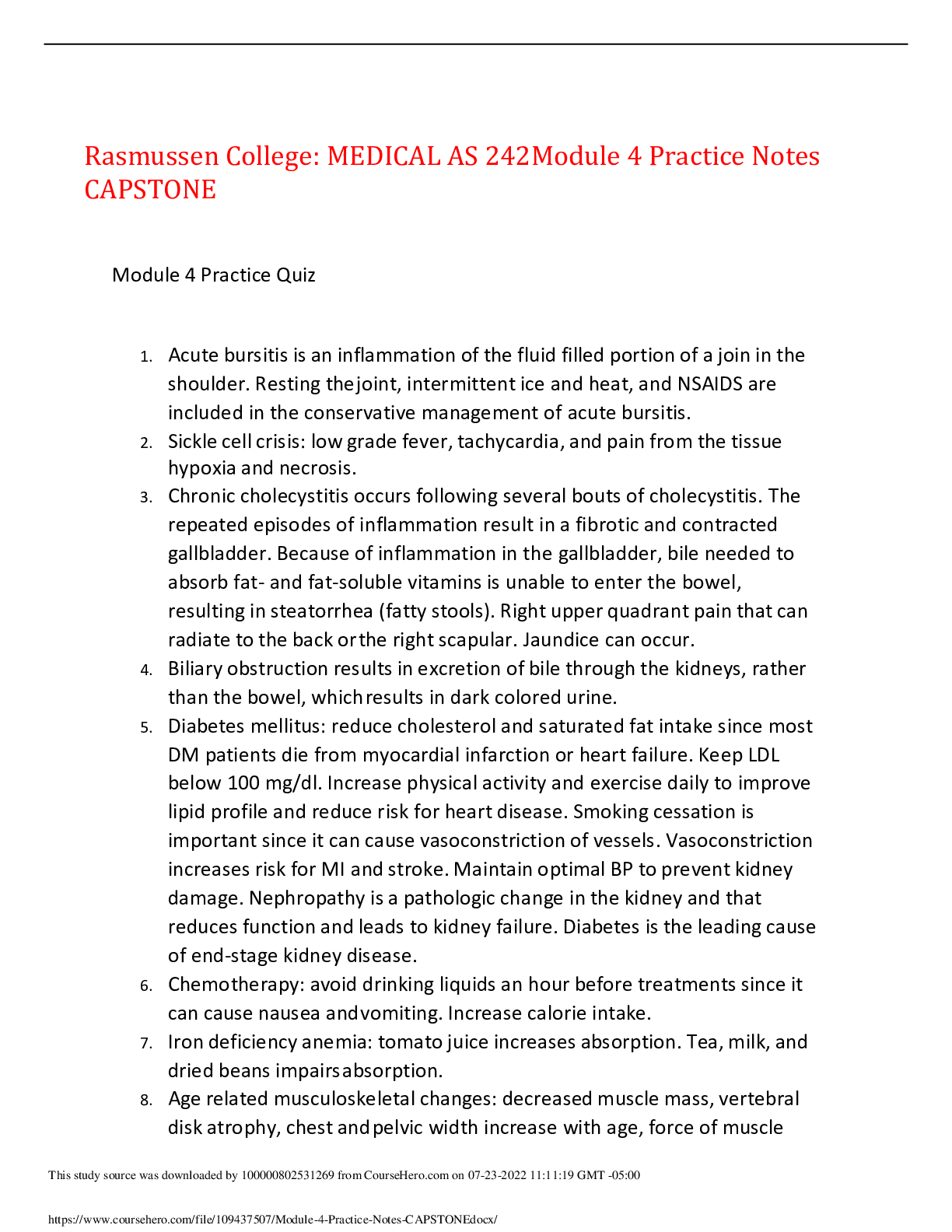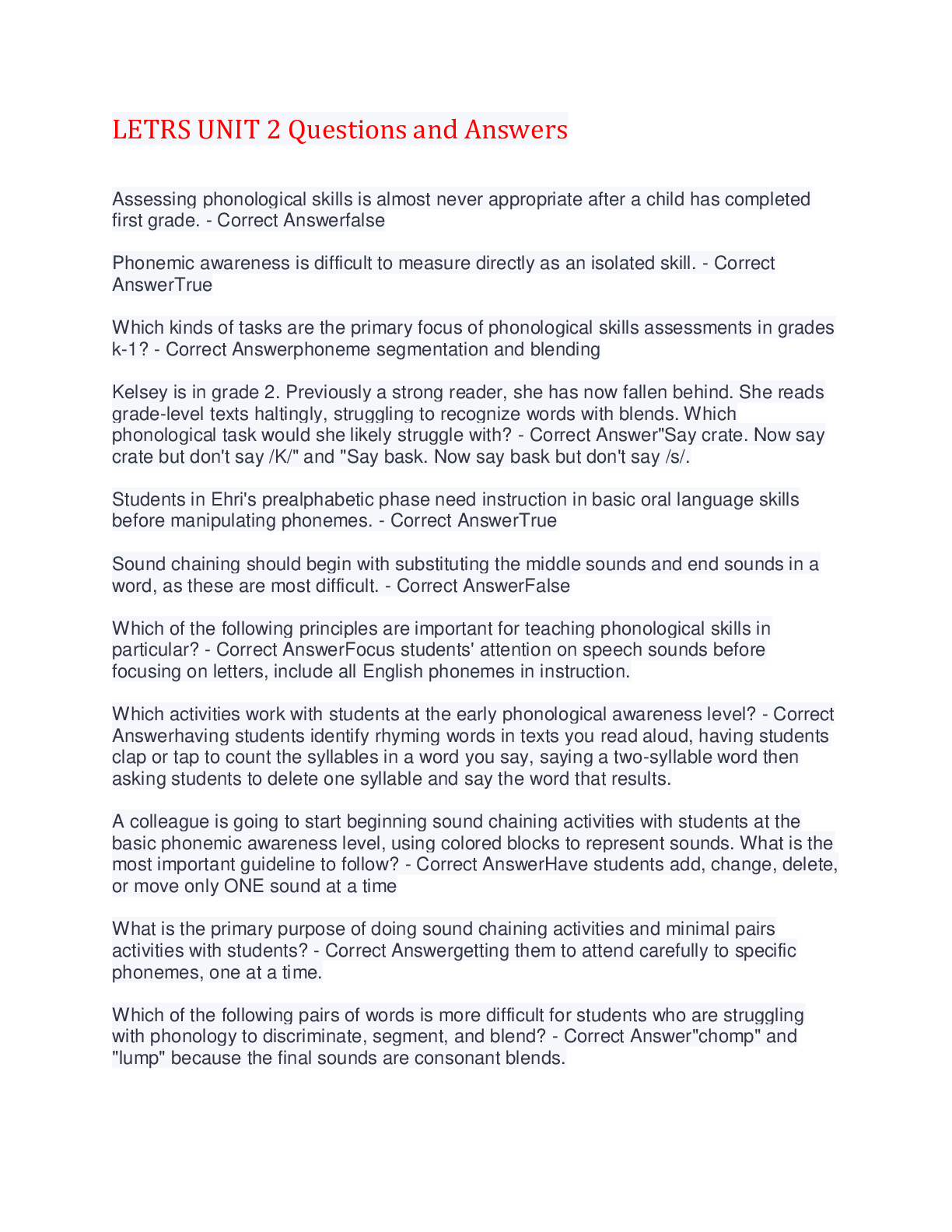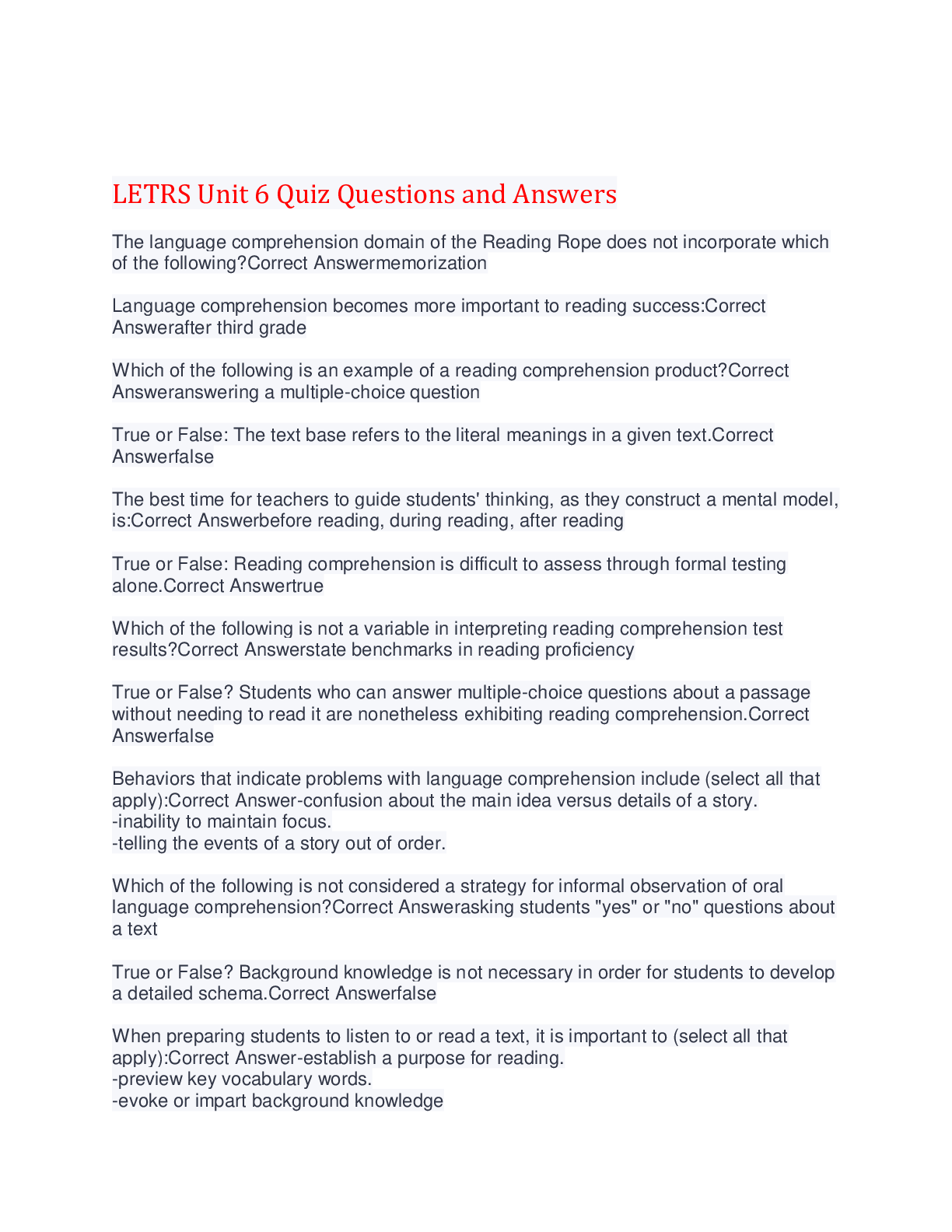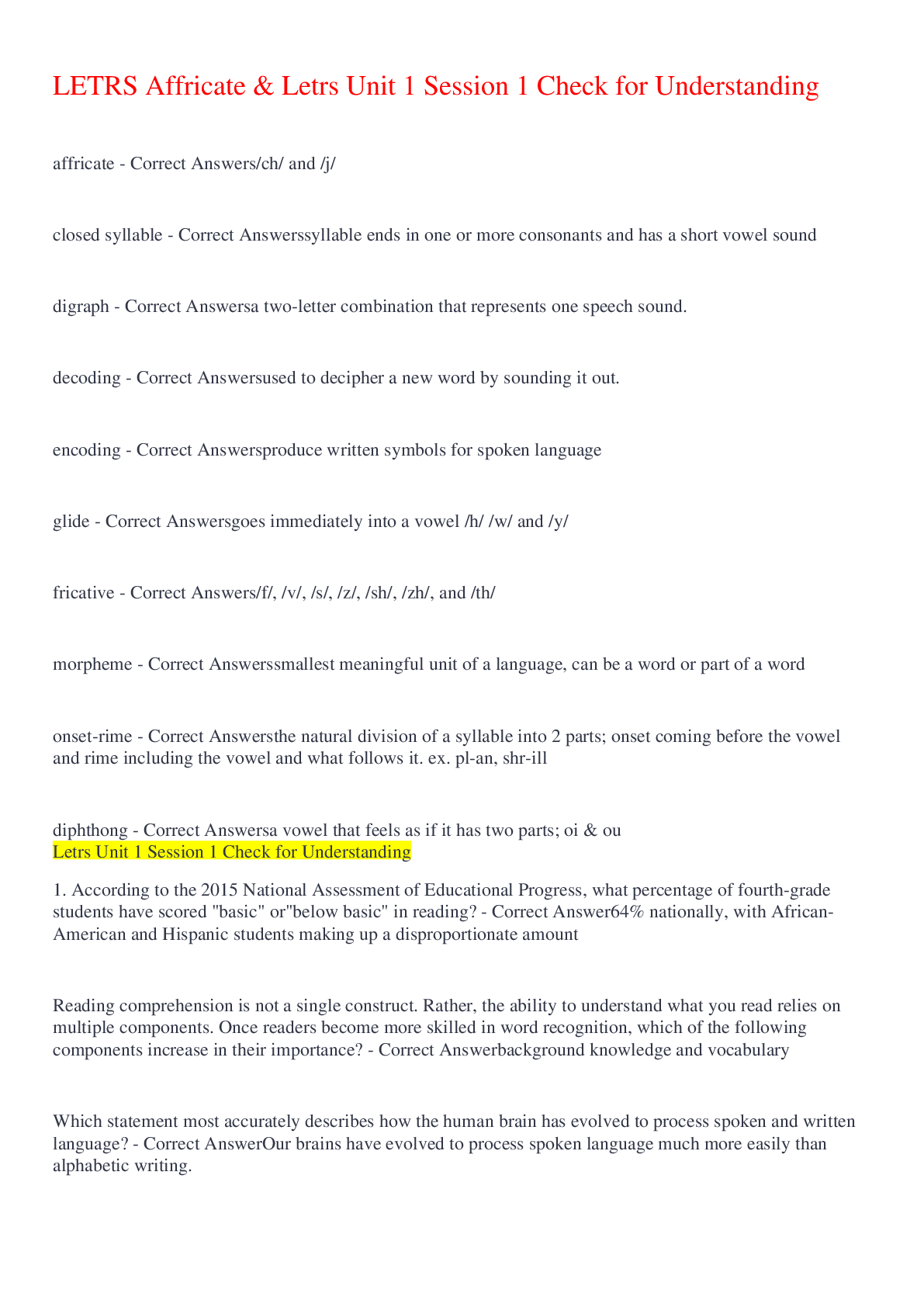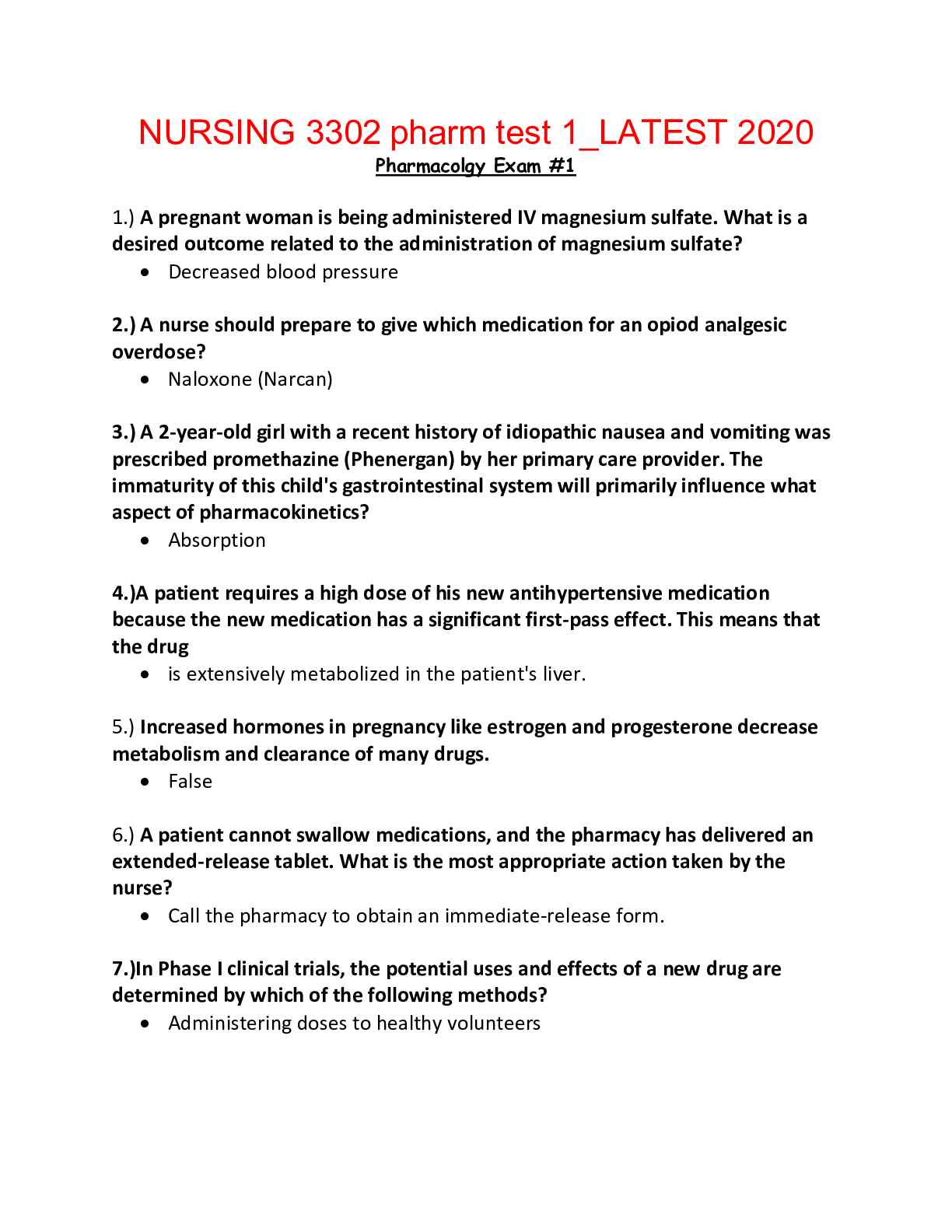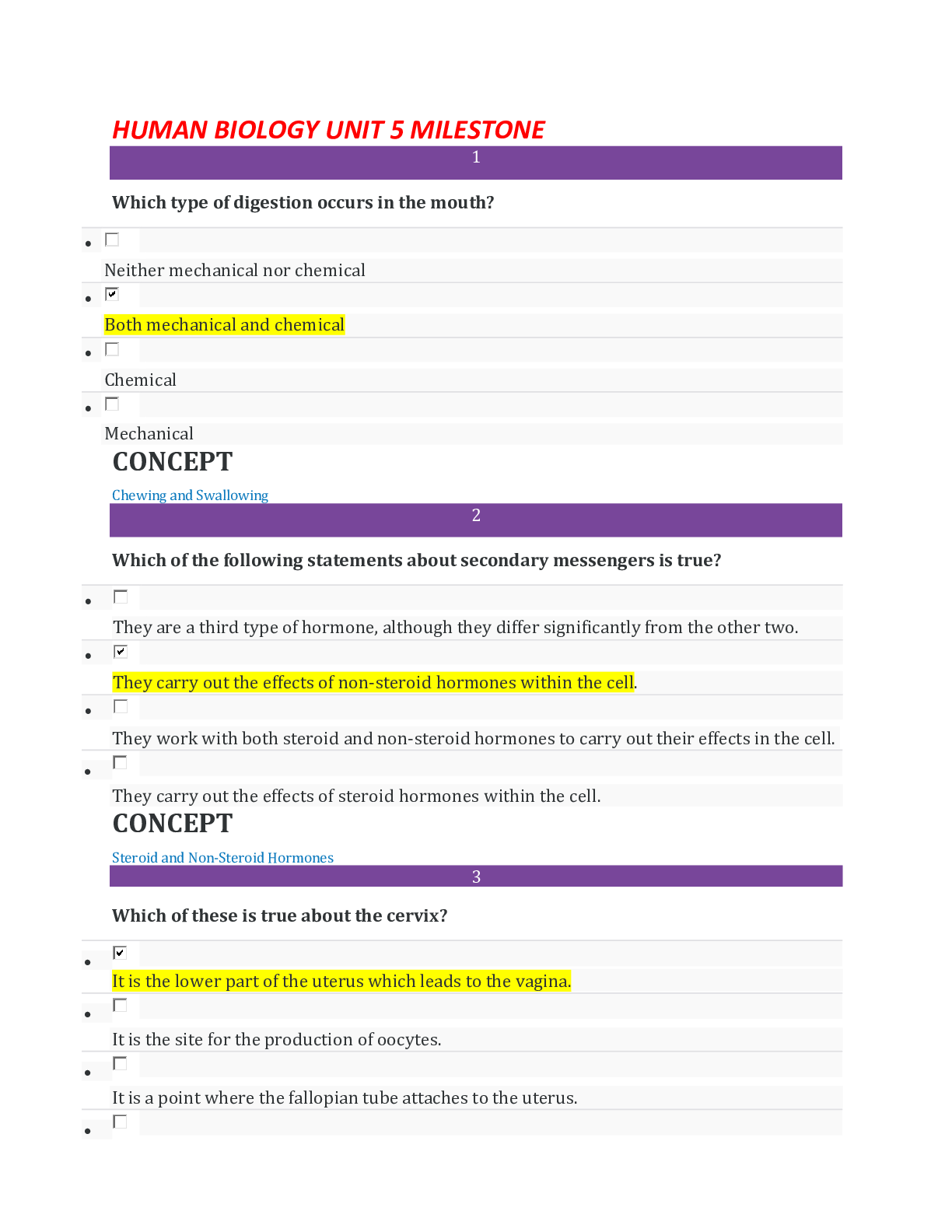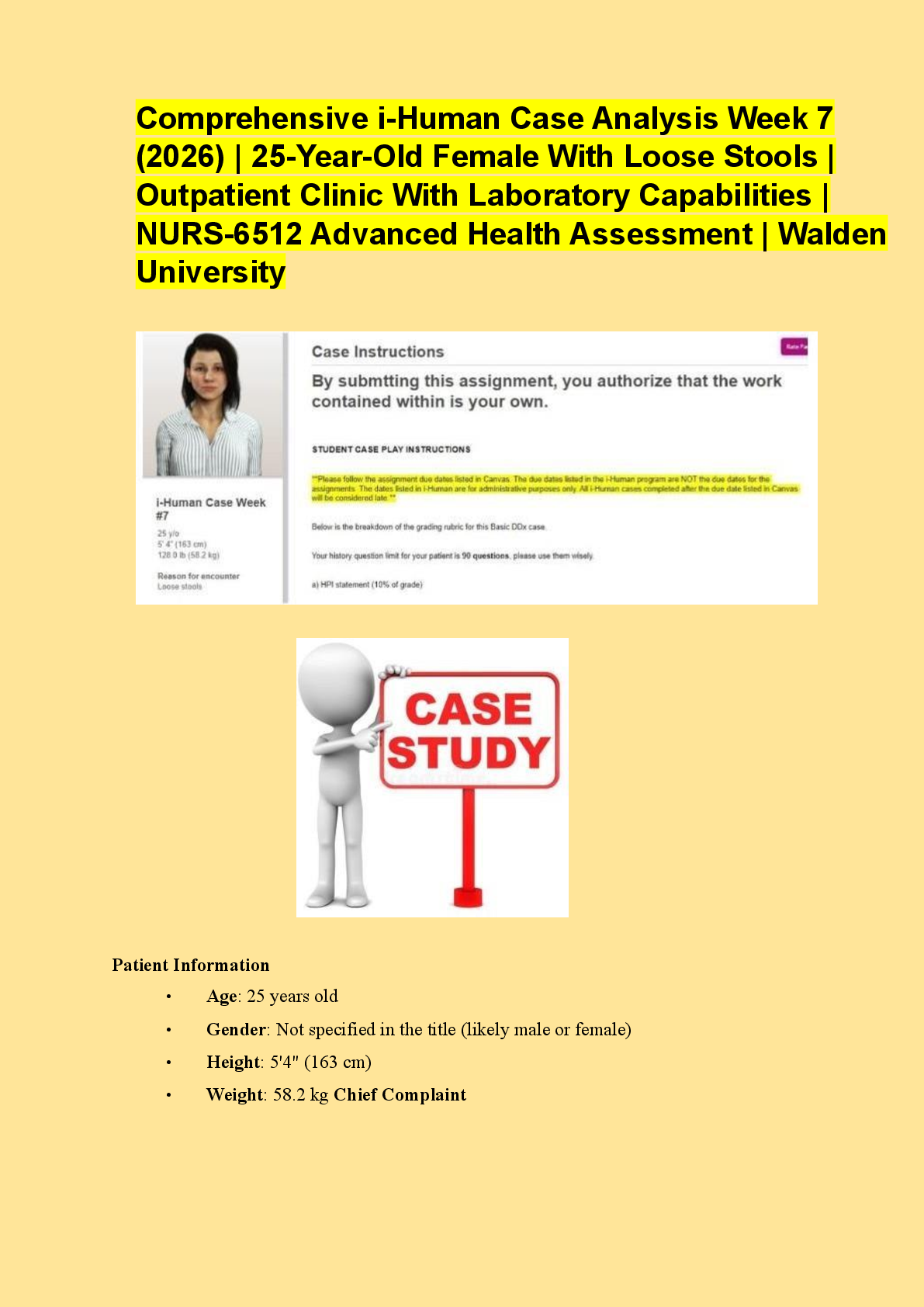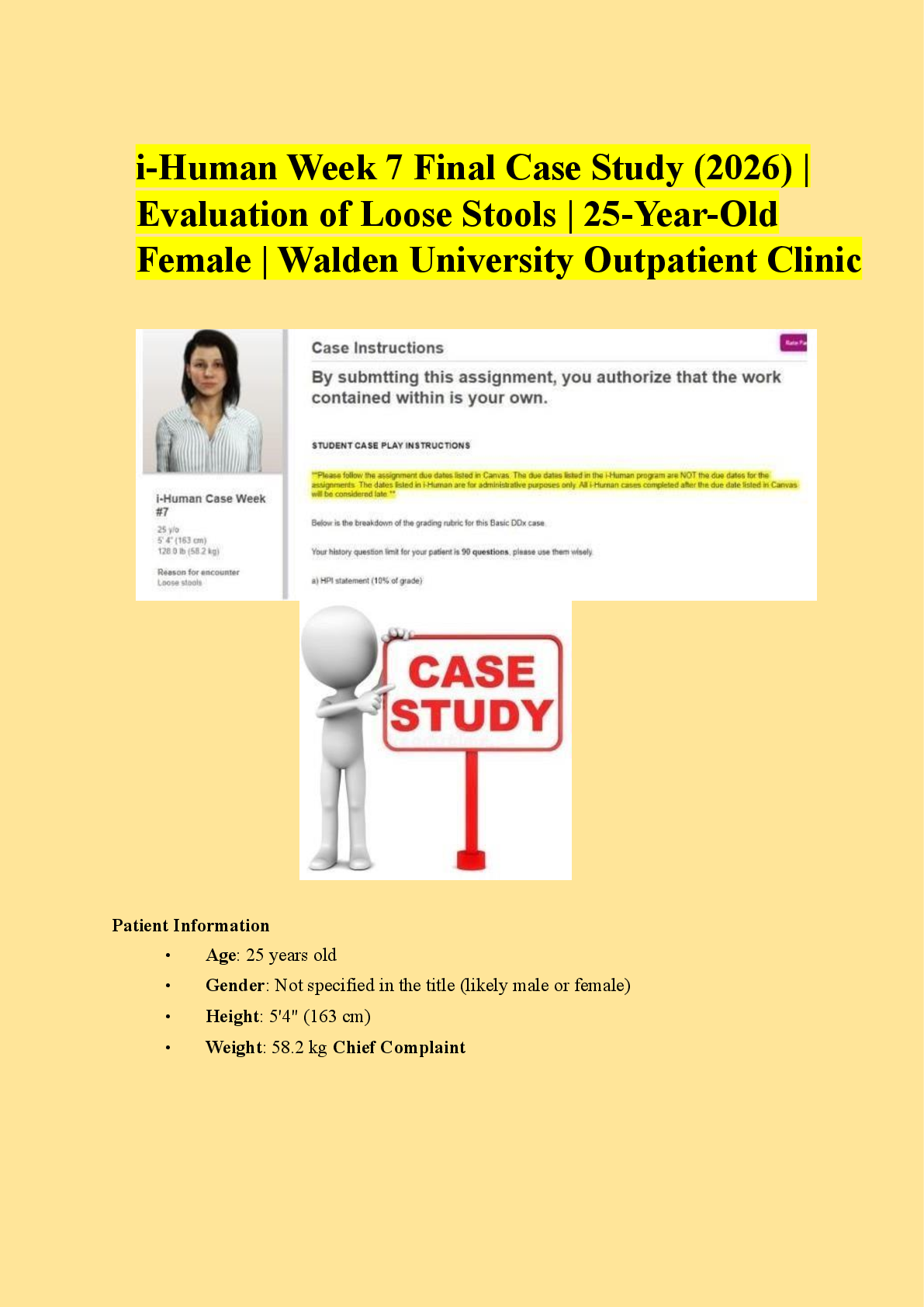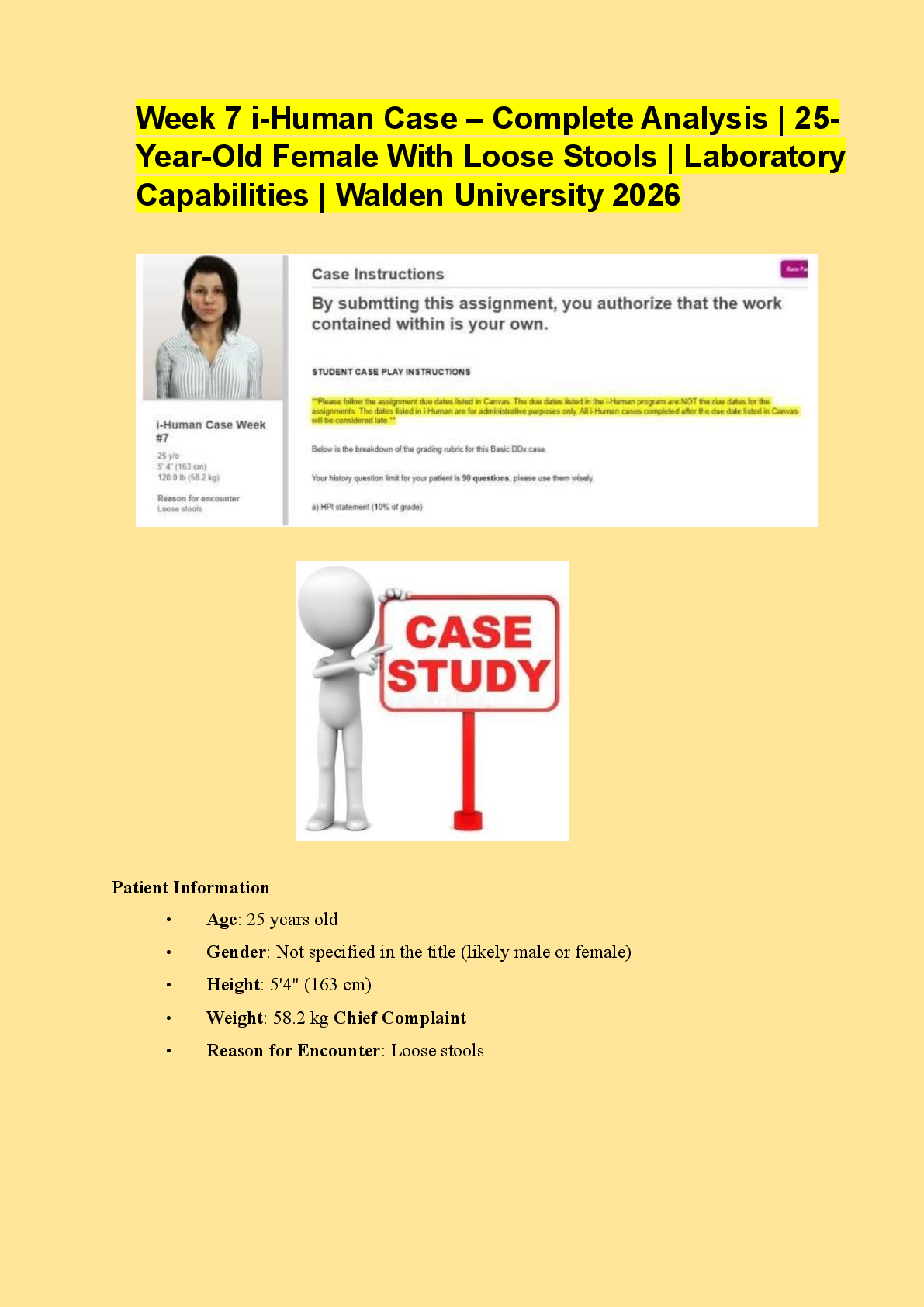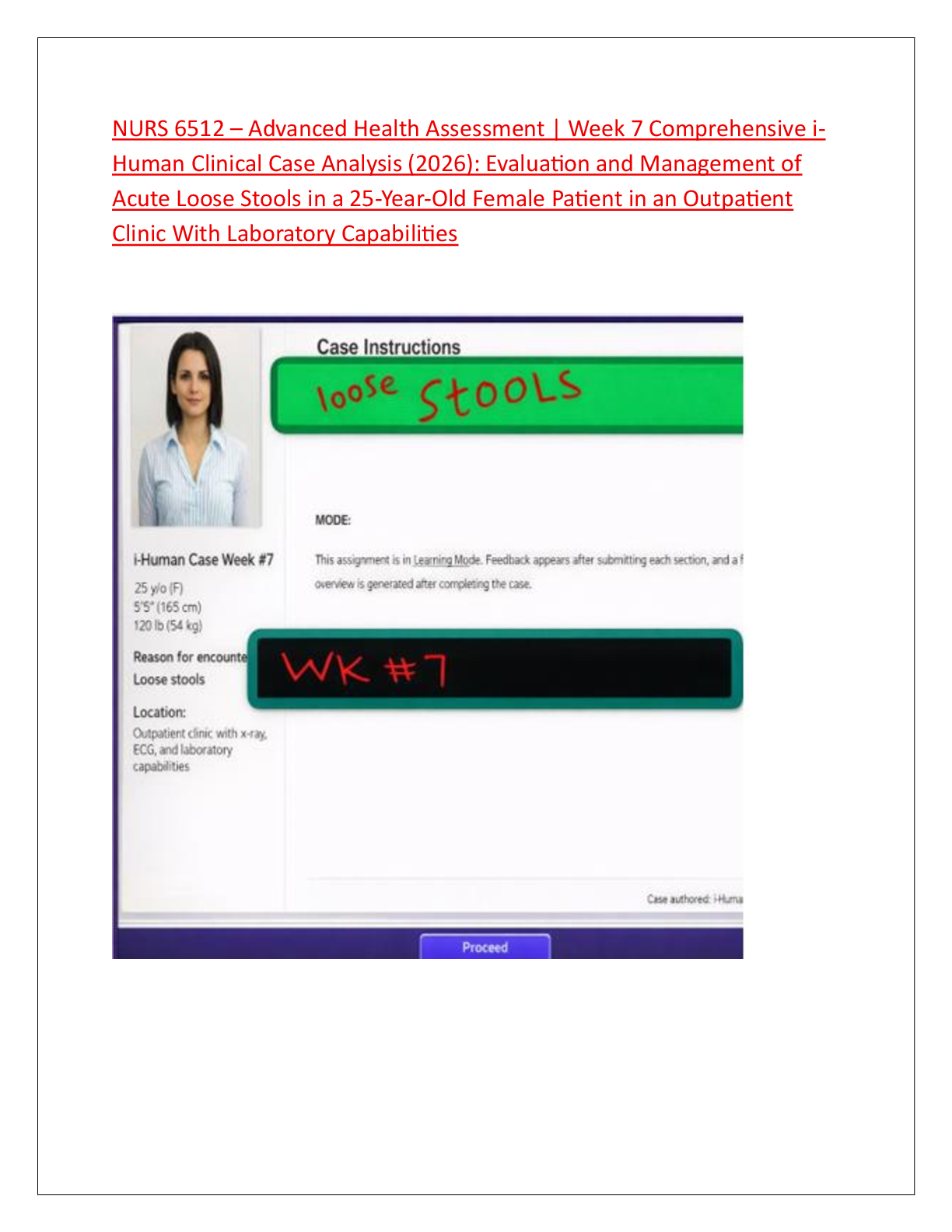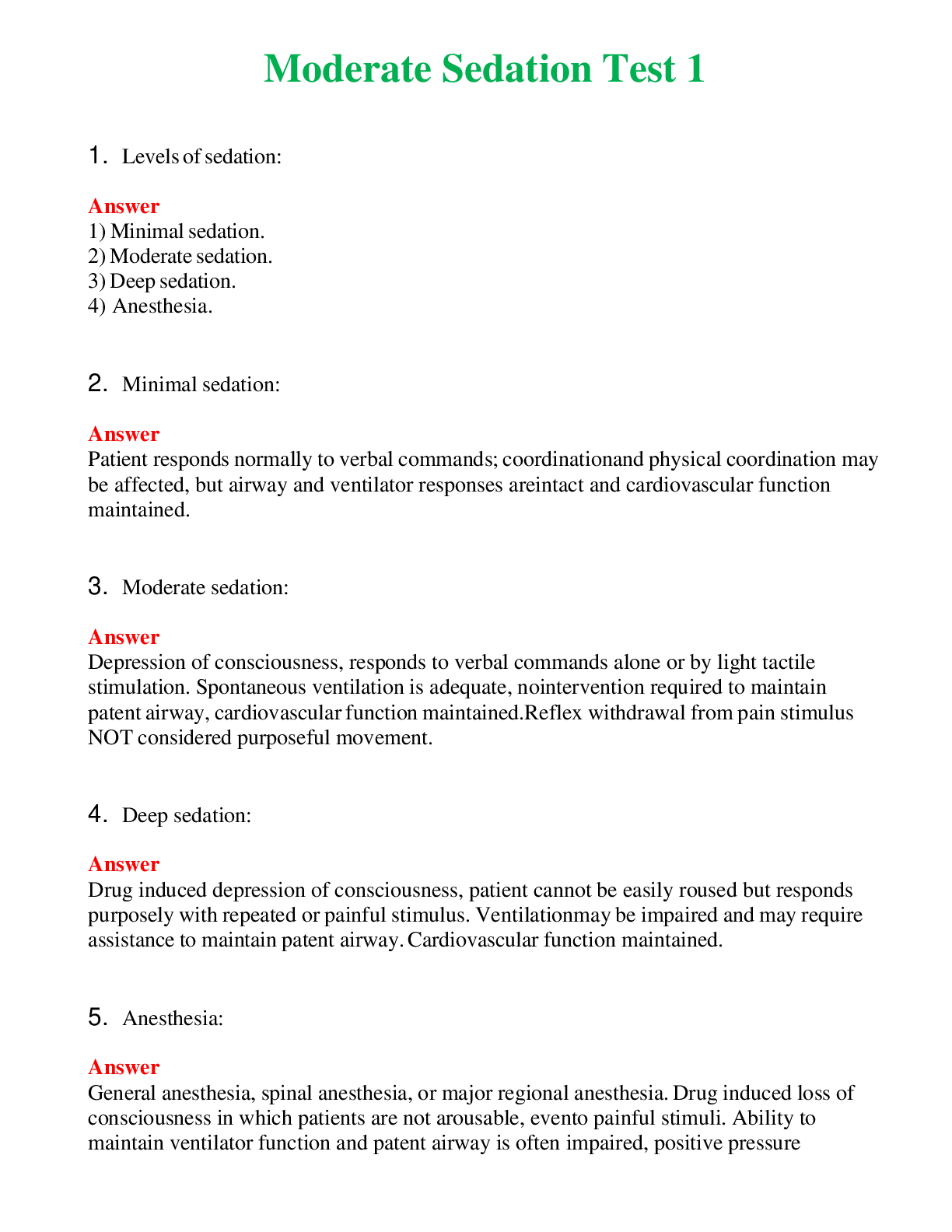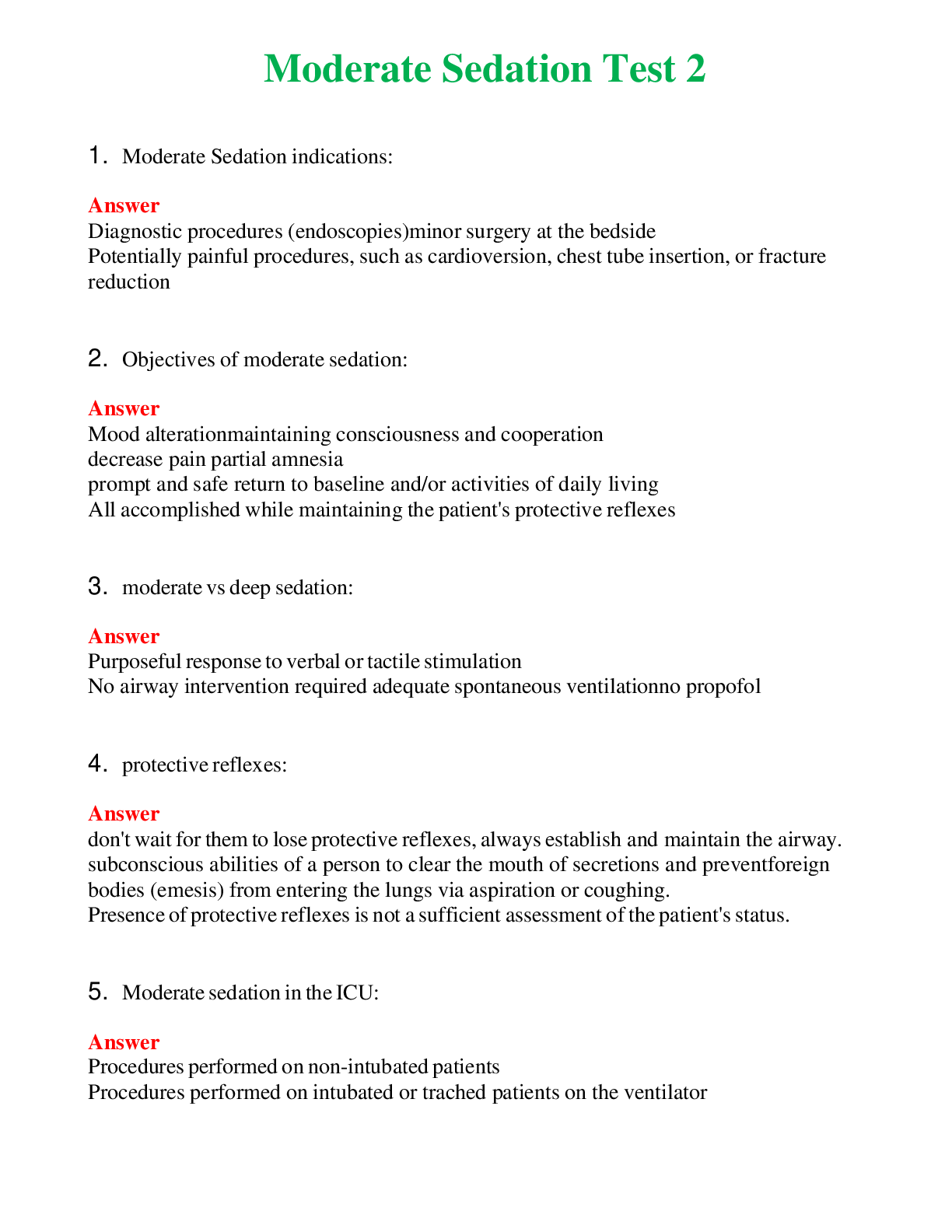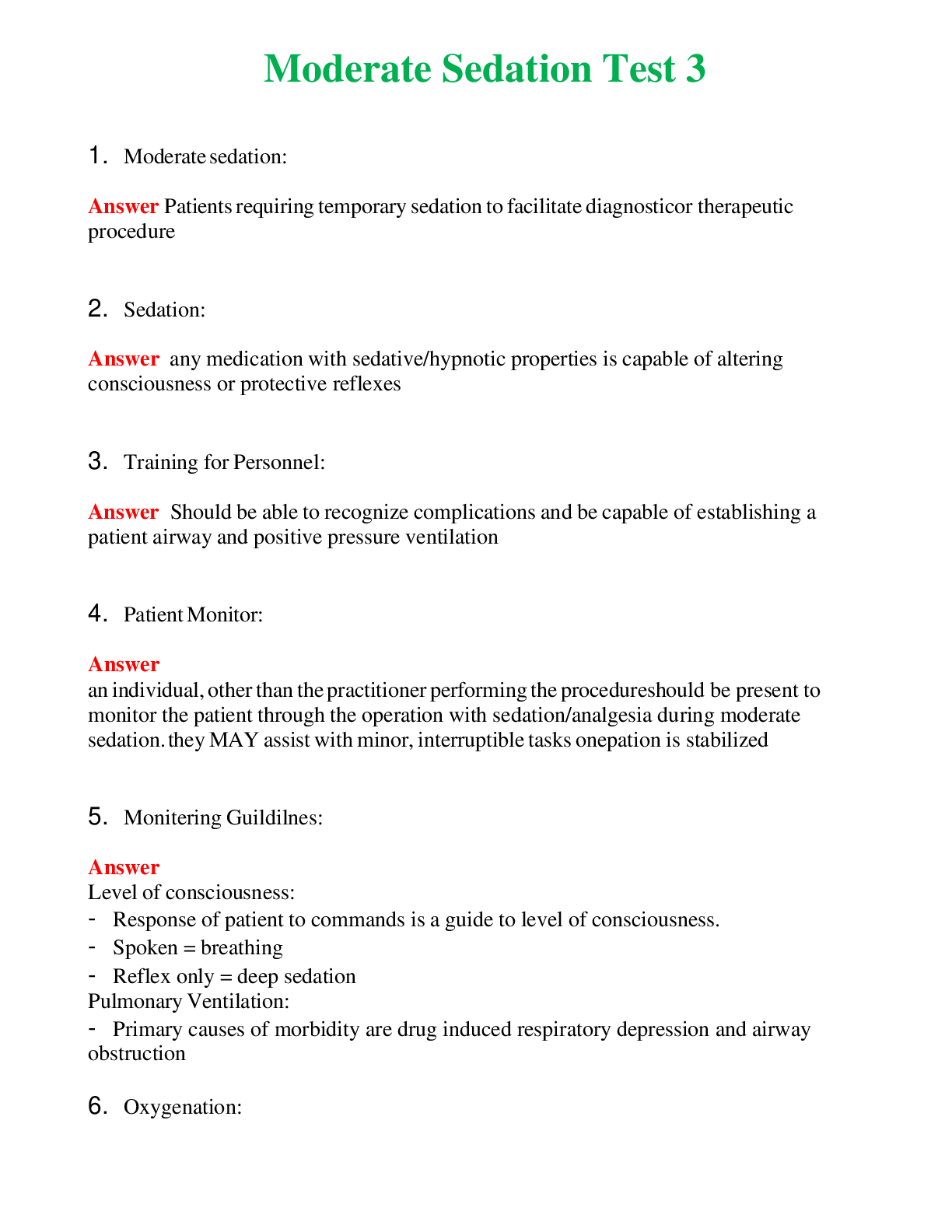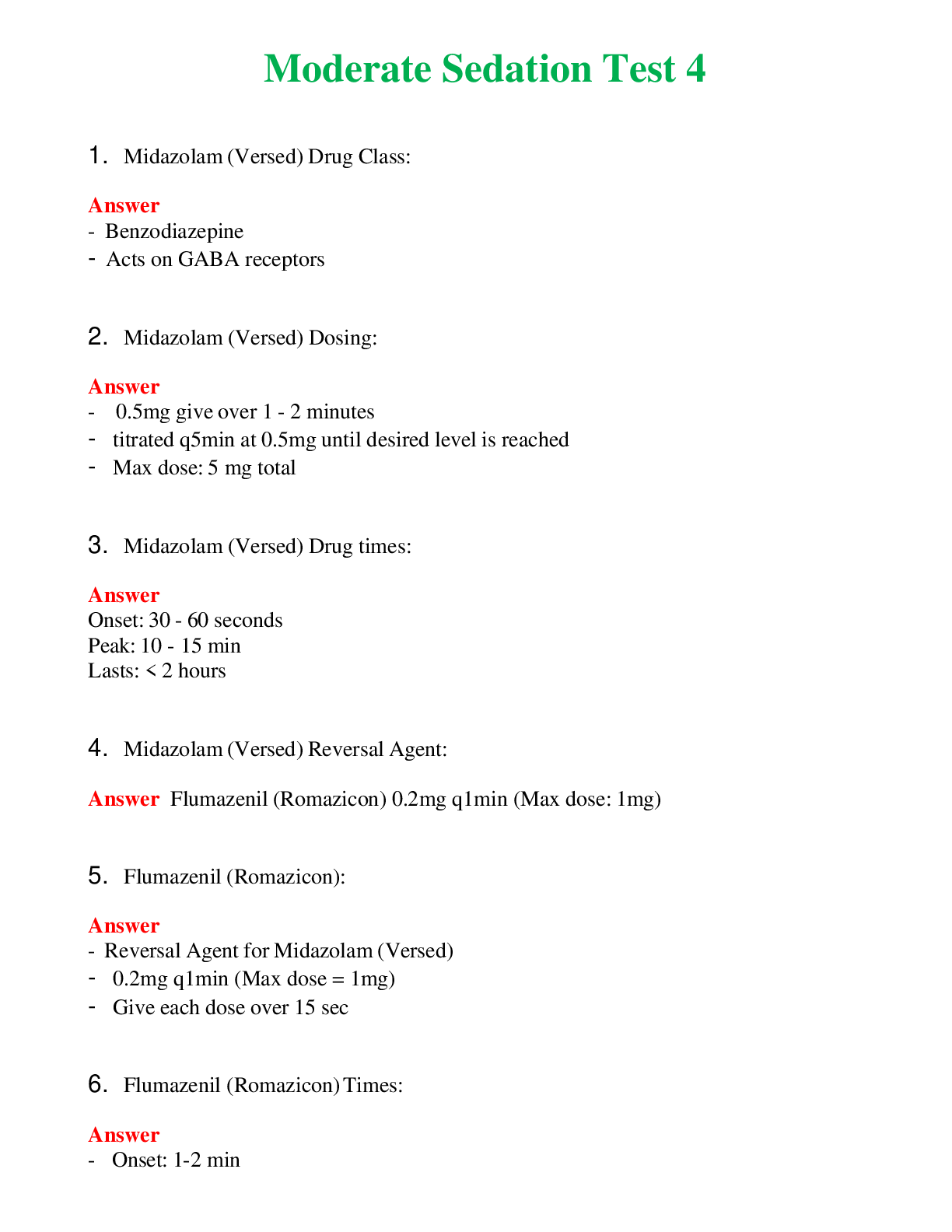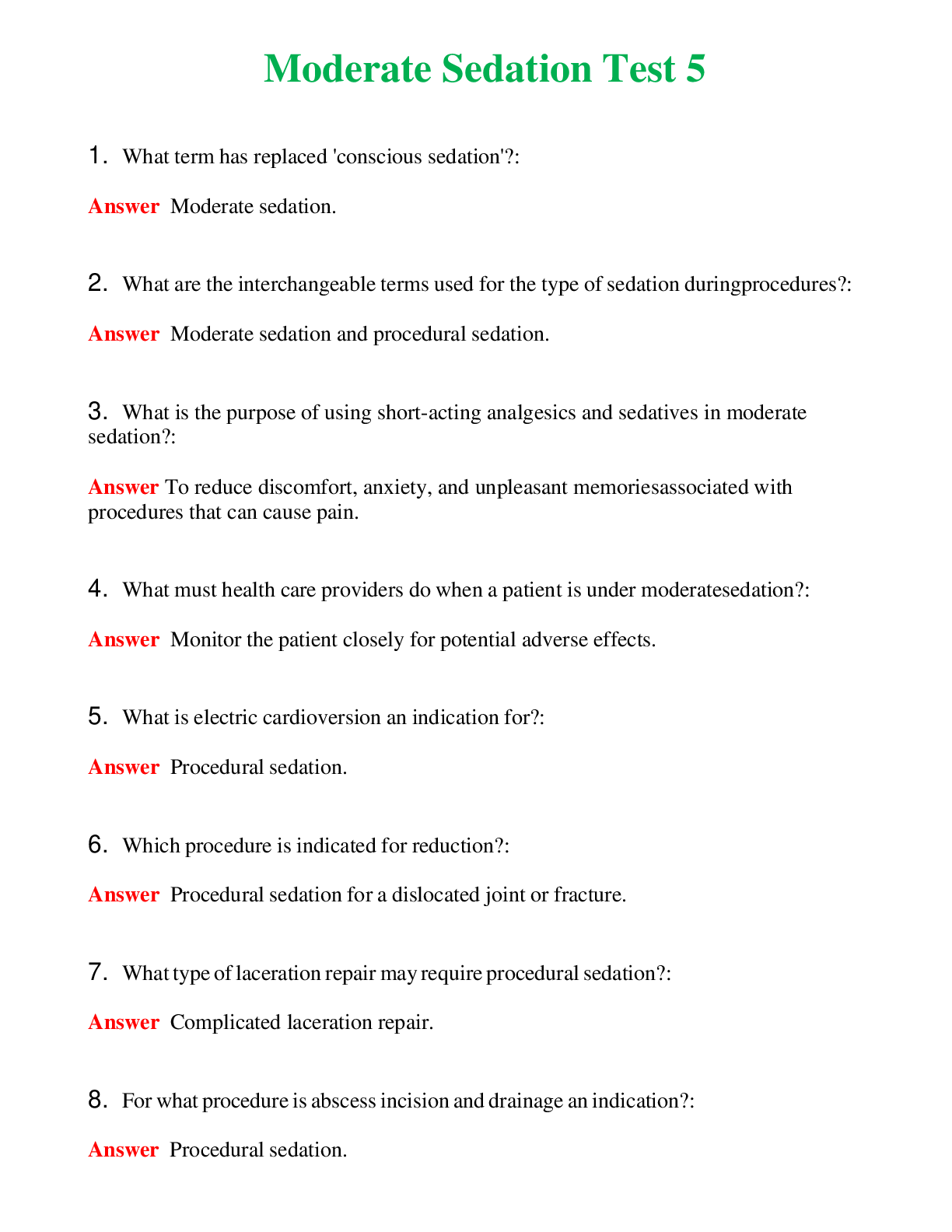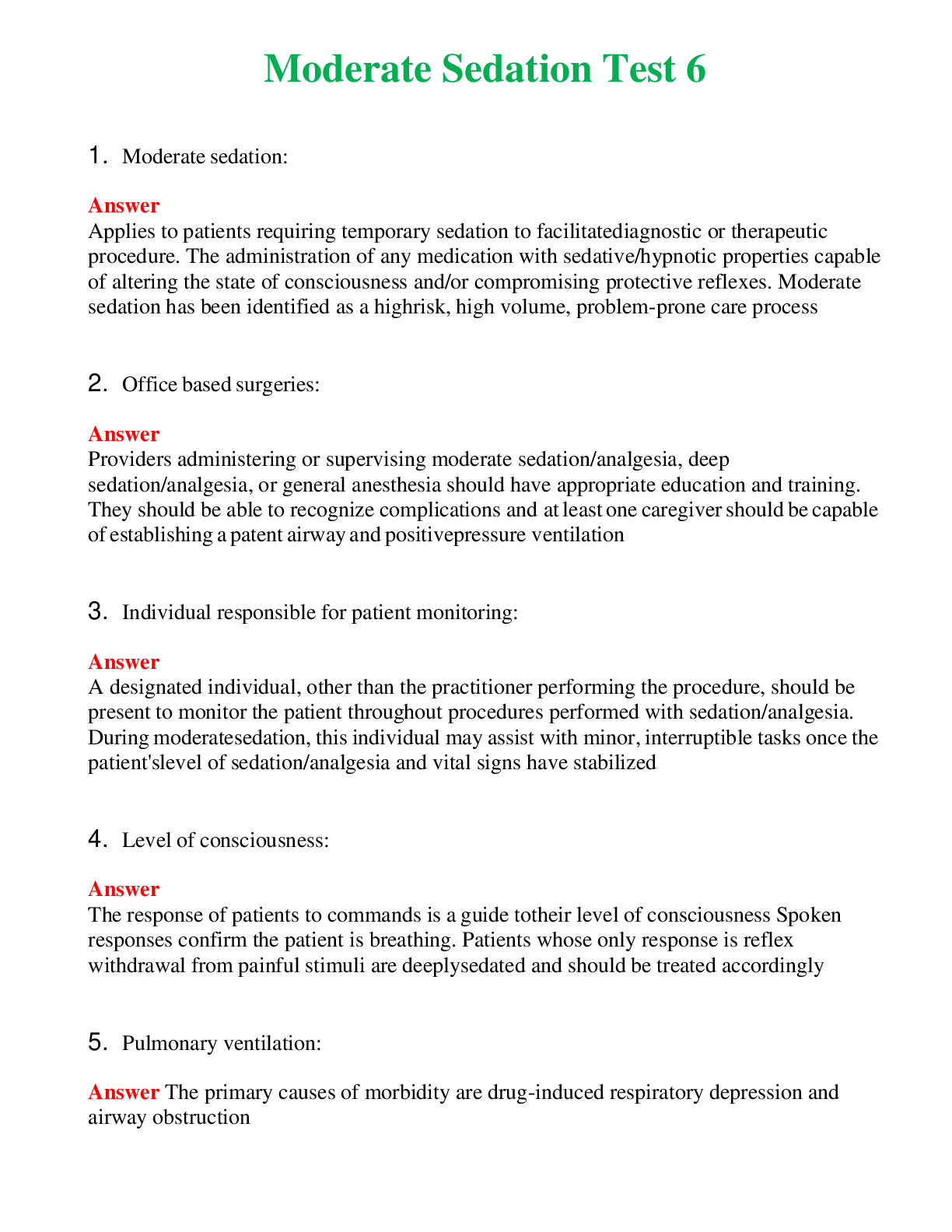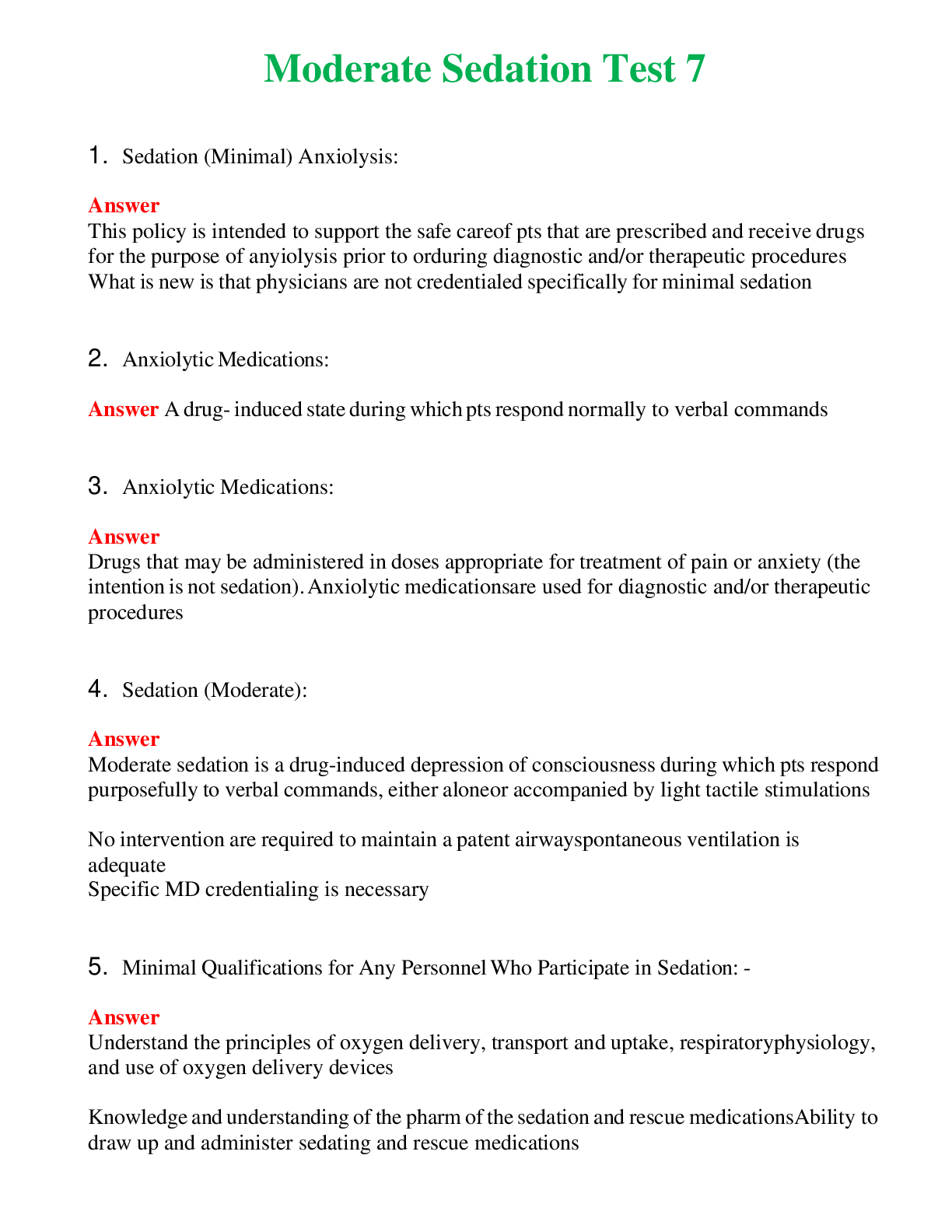Anthropology > EXAM > Anthro 41A Final Review (Maya_ menon) Exam 2021/2022,100% CORRECT (All)
Anthro 41A Final Review (Maya_ menon) Exam 2021/2022,100% CORRECT
Document Content and Description Below
Anthro 41A Final Review (Maya_ menon) Exam 2021/2022 Hernando Cortez Pt.1: • Lead Spanish group from Cuba in search of China/India • Arrives in Mexico in 1519 (same year the GOD Quetzalcoatl ... was predicted to arrive) Hernando Cortez Pt. 2: • Thinking he was possibly the God (Quetzalcoatl) the Aztecs sent him gifts) Hernando Cortez Pt. 3: • Later destroyed the Aztec Empire with his boats and with the Tlaxcalan allies (had 149,000 men who hated the Aztecs) after the Aztec population had been devastated by European Disease. Montezuma • Obsessed with Quetzalcoatl and believed Cortez to be him • He is taken hostage and the Aztec people begin to rebel • He is killed and Cortez and his men flee the city at midnight, but half of his men don’t make it. After Fleeing the Aztec city: • Cortez and his surviving men spend the next 18 months living with the Tlaxcalan and build small boats in preparation for an attack on the Aztec capital. Reasons for Aztec Conquest: • Due to the time of Cortez arrival, they believed he may by Quetzalcoatl (God) and instead of attacking him, they brought him gifts of gold and welcomed him into their capital. • After Cortez and his men fled from the Aztec city, 75% of the Aztec population died due to European disease. • Months later, Cortez returned and laid siege on the city for 80 days, starving of the remaining Aztecs. 1521: • The former Aztec empire became the Spanish Empire and Europe would suddenly gain a huge wealth. 1531: • The Inca Empire falls to Francisco Pizarro after being devastated by European disease • Spain now has access to the wealth of two major American Empires Emperor Charles I and V: • Descended from the Habsburg Family Charles I: • Was born in 1500 • Mother is Juan La Loca • Father was Philip The Handsome • Said to be born under the same signs as Caesar Augustus - Great Roman emperor Charles I Believed...: • Believed that if he could convert enough people to Christianity that the second coming of Jesus would occur. Juana La Loca: • The daughter of Ferdinand and Isabella the Catholics Philip the Handsome: • Had many affairs, son of emperor Maximillion (I) and Marie of Burgundy Eurocentric Economy: • Blaut argues that as the conquest of the Americas continues, Europe gains a huge economics advantage and the economic trade center shifts from the Indian Ocean to Europe, especially as Europe uses its American wealth to take control of the trade centers in the Indian Ocean region. Protocapitalism: • Occurs when trade becomes the primary economic practice • Trans-regional trade replaces agriculture as the economic engine of society • Middle classes tend to grow Capitalism: • Occurs when the middle classes take political power for themselves Protocapitalism to Capitalism: • Blaut argues that the new wealth from the Americas allows Europe to develops a growing middle class who will take political power for themselves and develop Europe into a set of capitalist states. Weber - Rise of Capitalism: • Weber unlike Blaut argues that the wealth coming in from the Americas was not enough to end feudalism on its own and develop capitalism. • Argues that it was up to the people of Europe to develop ideas/beliefs that they could overthrow the rulers and that the middle class could hold political power. Weber: • He noticed and argues that the transition to capitalism happened in Europe first in the protestant nations. then later in the Catholic nations. o Argues that there must be something about protestant attitudes that encourages the development of capitalism. Weber Statement: • He said that it was the protestants who first started challenging the power of traditional rules and their beliefs would pave way for a new capitalist state system that would replace the traditional feudal/tributary system. Protestants - Produced by Martin Luther (Lutherans): • This first wave of protestants believed that the pope was not God's representative and "protest" the popes claim to authority. • Anti Pope, but Pro King Protestants - King Henry VIII (Anglicans): • He created the second wave of protestants when he declared England was not longer Catholic (became Anglican) and was not subject to the popes authority so that he could divorce his wife. • Anti Pope -- Pro King Henry VIII: • Became incredibly wealthy by confiscating all of the Church property. • Declared England to no longer by Catholic, taking away the Popes authority, declaring himself the head of England so that he could divorce his wife. wives in order: Catherine of Aragon, Anne Boleyn, Jane Seymour Anne Boleyn: • Henry VIII second wife • Gives birth to Elizabeth • Henry has this wife executed for treason and which craft Jane Seymour: • Henry VIII Third wife • Have son - Edward VI Edward VI: • When Henry VIII dies, this son becomes the King of England • Dies at the age of 15 and names his cousin, Lady Jane Grey his successor Lady Jane Grey: • The great grand-daughter of Henry VIII, she becomes the ruler of England after Edward VI's death, but after 9 days Edward VI's older sister Bloody Mary I arrests and executes her Bloody Mary: • The daughter of Henry VIII + Catherine of Argon- She rules for 5 years o kills protestants o forces England to become catholic again o dies from cancer and Elizabeth becomes queen Queen Elizabeth: • The daughter of Henry VIII and second wife, Anne Boleyn • Takes throne after Mary dies, converts England from Catholicism to Protestantism and kills Catholics Henry 7th: • Took power in England in the late 1400 at the end of the war of Roses o Killed the previous king o Kills the previous King of England o Marries his daughter to the King of Scotland o Has two sons ▪ Arthur ▪ Henry VIII (8th) Arthur: • Married to Catherine of Argon o She is the sister of Juan La Loca o She is the daughter of Ferdinand and Isabella of Spain o Aunt of emperor Charles • Dies within a year of his marriage to Catherine Catherine of Argon: • After the death of her husband Arthur • She marries Arthurs brother, Henry VIII Henry VIII and Catherine: • They rule England for several years o They bear one child (Mary—Bloody Mary) Protestant: • A religious group that criticized practices of the Catholic church and rejected the Popes authority Protestants - John Calvin (Calvinists) • Led the third wave of protestants who were the most radical. Claimed that Christians should not obey the Pope but they should also disobey any kings who were ungodly. • Majority of these people were from European growing middle class Being religious, hard working and the accumulating wealth was viewed as a sign of God's approval (the "Protestant Ethic") • Nobility generally did not join Calvinist churches • The poor were unlikely to become Calvinists • Anti Pope and Anti King Calvinist Names by Location • Switzerland: Swiss Calvinists • Netherlands: Dutch Calvinists • France: Huguenots • Scotland: Presbyterians • England: Puritans • American Colonies: Pilgrims John Calvin: • Claimed that the rising of the middle class was God's elect and that they had the right to hold political power. Habsburg Myths: • This family had many myths about them. • The claimed to be descended from the royal family of ancient troy and from Julius Caesar and Caesar Augustus. Habsburg Myth – 2: • They claimed that they were chosen by God to prepare the way for the Kingdom of Heaven and Christ's second coming. Habsburg Myth – 3: • Claimed that the were destined to rule all Habsburg Myth – 4: • Believed that astrology supported their destiny to become a family of global christian rulers Emperor Frederick III: • The great-grandfather of Charles V o Elected as emperor by electors in Rome in 1451AD o His motto was A.E.I.O.U and included it in his signature o Had a son name Maximilian I, whom he elected to be co-emperor while he was still living Thomas Aquinas: • 13th Century Catholic Leader o argued that astrology was another way to understand part of Gods plan Fall of the Roman Empire: • The western half fell in 476AD to Barbarians and there was no emperor for the next 3.5 Centuries Fall of the Aztec/Incan Empire: • Led to an influx of wealth into Europe • Spain became the first “superpower” with Emperor Charles as their ruler • American empires fell to the conquistadors because of disease (mainly) • The Spanish were able to make alliances with local groups (such as the Tlaxcalans) who sent huge armies that gave the Spanish army an advantage over the others 800 AD Charlemagne: • After rescuing the Pope and saving Rome from Invasion he was crowned Emperor on December 25, 800AD. o Becomes the first of a series of new European Emperors known as "Holy Roman Emperors" Holy Roman Emperors: • A series of new emperors in Rome starting with Charlemagne in 800 o The new emperors have the duty of protecting the Catholic Church and the Pope Electors: • Nobility in the Holy Roman Empire who were responsible for electing the Emperors. Number of Electors: • 7-10 o Held title as and picked future Roman emperor o Often Bribed o Held a lot of power Martin Luther: • Started the Protestant Reformation - led the first wave. o Sent to the Vatican on church business (the pope at the time was Pope Leo X) o Was very decadent, even immoral and spent huge sums of money which he raised through the church by selling indulgences Martin Luther’s Challenge: • Challenged the sale of indulgences and the doctrine of transubstantiation. o Rationality over Mysticism and Faith o Conscience instead of rituals and sacraments Said that every person could commune directly with God without the need of clergy or priests o Study of bible as preferred way of learning Purgatory: • A place you go after dying for purification o Required before entering heaven o More sins = more time spent here 95 Theses: • Luther's list of complaints o Posted on the Church's door on Oct. 31 1517 Lutherans: • Followers of who were expelled from the church Meritocracy: • Some people earn the right to have political power The Diet of the Worms: • In 1521, Martin Luther is charged with Heresy and must go on trial before young emperor Charles, this trial is called... Duke Frederick of Saxony: • An elector o Is a supporter of Luther and attends the trial, prevents him from getting charged w / treason -arranged for bandits to "kidnap" Luther and hide him form the emperor and the pope for several years in Wartburg Castle The Diet of the Worms Trial: • At the trial Luther refuses to recant his criticisms of the Pope and the Church • He is sent home to await the emperor’s decision • On his way home he is kidnapped by Bandits whom were hired by Fred. of Saxony • Luther is hidden in Wartburg Castle -- stays for a couple of years • Emperor declares that Luther and anyone who helps him is an outlaw The Peasants War: • 1524-1526: The first of many wars that would characterize the protestant reformation over the next 130 years • While hiding in the Castle • While hiding, some of Lutherans followers begin to claim that not only do they not have to pay taxes to the church, but they do not have to pay taxes to the nobility 1524: • Some peasants go to war against the Nobility o 100,000 peasants are killed by emperors Charles’ men Feudalism: • The those considered to be noble are expected to hold more wealth than the other classes in order to serve and protect society • "Noblesse Oblige" The growing middle class: • They had no intent on using their wealth to better society. they used their money to simply make more money Loaned out money for interest fees: • The parable of the talents Told by Jesus-Mentioned Twice in the Bible: • Used by Calvin as a religious and moral justification for accumulating large sums of wealth o Calvinists believed that making money was a sign that they are pleasing to God and viewed themselves as gods "elect" France: • A series of religious wars in the 1500's b/w Huguenots and the Catholic Monarchy An effort to end the wars: • A marriage occurred in 1572 b/w the catholic sister of the king of France -- Princess Margot -- and a Huguenot cousin, Prince Henry of Navarre St. Bartholomew’s Day: • August 22 1572 – Massacre o The Huguenots are slaughtered in Paris after the Wedding b/w Henry of Navarre (Huguenot) and Princess Margot (Catholic) o Approved by The French Queen Mother, Catherine de Medici and her son, the young King Charles IX of France o Most Huguenots flee to the Netherlands (Dutch Calvinists) The Netherlands and Spain: • The two countries are given by emperor Charles to his son, King Phillip II and the Catholic Church • Ruled by an elected body known as the states general States General: • Rule to countries o Voters must be white, male, protestant, and wealthy • Women, the poor, people of color and non protestants have no political power Phillip II: • King of Spain o Sends his Navy against the Dutch Republic and England in 1588 o Huge storm destroys much of Spanish Armada and the Dutch Republic and England defeat Spain 30 Years War 1618-1648: • The worst war of the protestant reformation o The habsburg family (Catholics) goes to war against the protestants in the empire o This war quickly spreads across all of Europe except the British Bies o Over 7 million Europeans dies o Resolved with the "peace of Westphalia" Peace of Westphalia: • This finally resolved the 30 years war between the Catholic Habsburg Family and the protestants that spread across all of Europe and killed 7 million people Peace of Westphalia—Started in 1646—Ended in 1648 W. Europe • This is regarded as the formal end of feudalism in much of western Europe The Peace of Westphalia - What it stated: • That a country's boundaries could no longer change due to war/conquest/marriage • Each country had to declare a national/unalterable religion • The ruler of each nation had to practice the national religion • The pope could no longer demand taxes from any country 5) the emperor now only had political power in his homeland of Austria, and no influence outside of it Puritan rebellion - 1640-1660 (Or the English Civil War): • Oliver Cromwell, leads the Puritan rebellion (they were anti King) against king Charles I of England o Cromwell = Lord Protectorate, becomes strict o Rules from 1649 until 1660 when Charles II takes England back King Charles I: • He is executed and Oliver Cromwell takes over control of England using Martial Law Oliver Cromwell: • Lead the puritan rebellion in England that lasted from 1640-1660 o He executed King Charles I and took control of England using Martial Law o He was "Lord Protectorate" of England until his death in 1659 King Charles II: • After the execution of Charles I by Oliver Cromwell and the death of Oliver Cromwell in 1659, Charles I son, Charles II becomes the king and England restores the monarchy. o He is very popular, but when he dies he has not heirs so his brother becomes King James II King James II: • Catholic & hated by a majority of England o Has a protestant daughter name Mary (Not Bloody Mary) The Glorious Revolution: • The second war in 1688 o The bourgeoisie whom dislikes King James II of England because he is Catholic, invites his Daughter Mary and her Dutch Husband, William of Orange to bring their Army and force James II off of the throne. o William and Mary are England's first "constitutional monarchs" which means that their powers are limited and controlled by laws passed by the Parliament. James II Daughter – Mary: • She is married to Dutch general William of Orange o She and William bring Dutch Army to England with little blood shed o James II (Father) flees England and Her and William of Orange become the New Monarchs English Bill of Rights: • Passed by Parliament 1689 - Guarantees the right to vote in England for white, male, protestant, wealthy English subjects Protestant Discipline: • Work vs. Pleasure o They believe that making money is pleasing God so they begin to work more and attend church more. Dancing, sports, drinking, music and other distractions from work are sinful. o Work is morally good and glorifying to God. Making and accumulating money is a sign of God's approval, but don’t waste it on pleasure, luxury or other forms of sin. Calvinist life revolves around working and attending church -Death of a Miser: painting intending to help Christians choose Christ instead of indulging in money Bourgeoisie: • This is the New rising middle class whom have risen as a result of colonialism and the conquest of the new world. Empowered by the teachings of John Calvinist, they will eventually seek and fight for political power in W. Europe. Ex. formation of Dutch Republic, English Civil War, Glorious Revolution Treaty of Augsburg: • 1555: Emperor Charles grants religious tolerance to Lutherans but Calvinists- large due to Charles being defeated by Henry II who was helped by Protestants who were angry at his oppression Thirty Years War: • 1618-1648: Habsburgs permitted religious persecution against Lutherans in the HRE- angry protestants form Evangelical Union and fight against Hapsburg Ferdinand II- Ends with the TREATY OF WESTPHALIA IN 1648 Sultan Osman II: • Sultan of Ottoman Empire that helped the Protestants out during the Thirty Years War Treaty of Westphalia: • 1648 - ends Thirty Years War + makes politically sovereign nation states with strict borders + religions= marks FINAL END OF FEUDALISM -Reduces the HRE's power drastically, also reduces the Pope's power b/c the Protestants states don't pay taxes to him Mercantilism-Proto capitalism: • Banking, Trade, Finance, were growing during the Middle Ages and this resulted in growth of the middle classes - However, there would be no full-scale capitalism until the bourgeoisie gain political power for themselves in the new capitalist nation-states (such as what happened in The Dutch Republic). Dutch Republic: • The Lower Countries (Netherlands + Belgium) declared independence from Phillip II w the Act of Abjuration- Couldn't find ruler so became a REPUBLIC- w/ wealthy middle class called STATES GENERAL (mostly Calvinists) o Was a MERITOCRACY- The wealthy nobles as well as capitalists passed laws promoting trade and business in their mutual favor & poor were excluded from power o FIRST EXAMPLE OF A CAPITALIST NATION Spanish Armada: • Phillip II sends ships to destroy English and Dutch Protestantism - a storm wipes out half the navy, the other half = defeated by Elizabeth I; England becomes most powerful navy force Puritans and Pilgrims: • Puritans were unhappy with the Church of England (the Anglican Church). Even though it is Protestant, the Church of England does not follow the teachings of John Calvin and it is controlled by the English monarchy. Puritans, on the other hand, follow the teachings of John Calvin and are unhappy with the monarchy's power. Some Puritans, known as pilgrims, go to America in 1620 and set up colony at Plymouth When did full scale capitalism in Europe actually occur?: • Banking, Trade, Finance, were growing during the Middle Ages and this resulted in growth of the middle classes - However, there would be no full-scale capitalism until the bourgeoisie gain political power for themselves in the new capitalist nation-states (such as what happened in The Dutch Republic). Huguenots: • French Calvinists who followed the beliefs of John Calvin and frequently challenged the power of the French Catholic monarchy • Many Huguenots would flee France after thousands of years and then will become victims of a series of massacres known as the St. Bartholomew’s Day Massacre approved by the French monarchy • Began 1572 after the wedding between King Henry of Navarre (a Huguenot) and Princess Margaret of France (Catholic) Essay Questions: • Explain the links between the rising of European middle classes, the Protestant Reformation, Calvinism, the colonization of the Americas and the changes in political power (from nobility to bourgeoisie) during the late 1500s and 1600s. How did these events contribute to the rise of the modern-nation state and capitalism? o Money poured in from the Americas that lead to the rapid growth of a European middle class o Calvinism brought new ideas and values that emphasized that the nobility are a problem o Calvinism and the middle class challenged feudal authority and the power of the traditional rulers o This led to the creation of individual nation-states that would replace the feudal system [Show More]
Last updated: 3 years ago
Preview 1 out of 23 pages
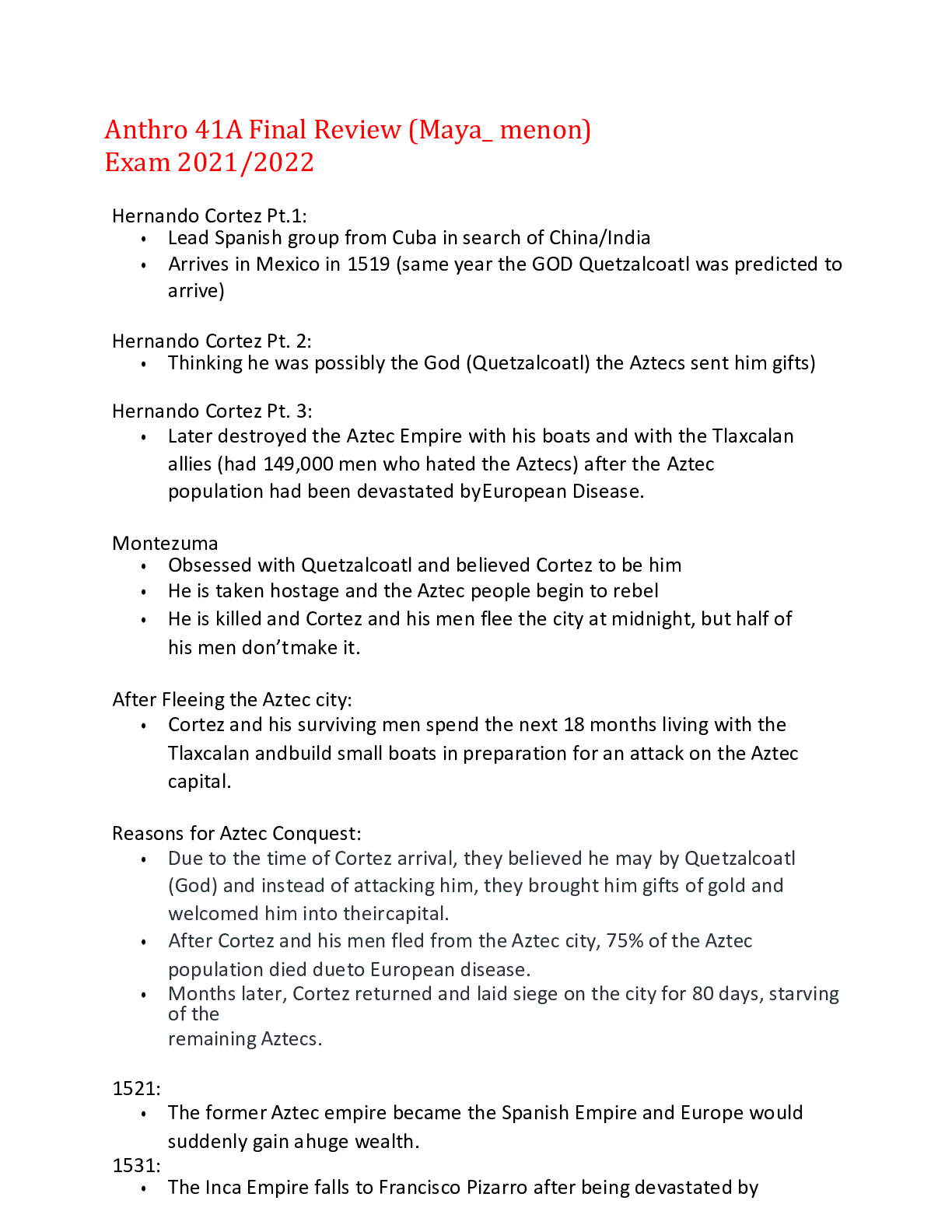
Buy this document to get the full access instantly
Instant Download Access after purchase
Buy NowInstant download
We Accept:

Reviews( 0 )
$15.00
Can't find what you want? Try our AI powered Search
Document information
Connected school, study & course
About the document
Uploaded On
Jun 02, 2022
Number of pages
23
Written in
All
Additional information
This document has been written for:
Uploaded
Jun 02, 2022
Downloads
0
Views
900



